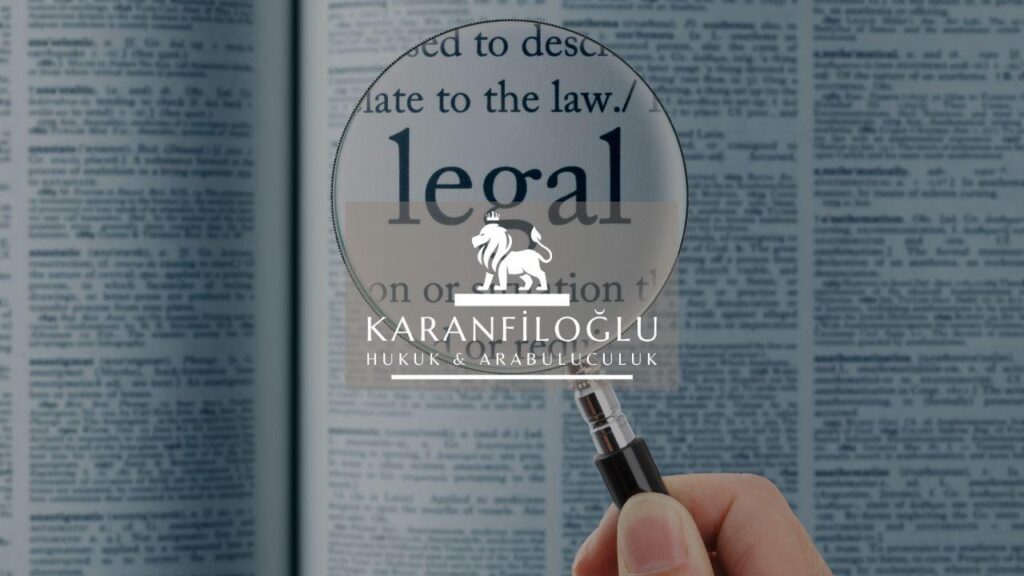In Turkey, inheritance law is mainly governed by the Turkish Civil Code (Law No. 4721), which outlines the procedures and distribution of an estate following a person’s death. Articles 495 through 682 of the Turkish Civil Code comprehensively regulate inheritance issues, including the rights of heirs, distribution shares, and processes for contesting wills. At Karanfiloglu Law Office, we understand that navigating the complexities of these laws can be challenging, especially for those unfamiliar with the Turkish legal system. Our team of experienced lawyers is equipped to provide expert guidance and representation, ensuring that the lawful rights of heirs are protected and that the distribution process adheres to the stipulated legal framework. Whether you are an heir dealing with an estate or need assistance drafting a will in compliance with Turkish regulations, our skilled attorneys are here to help you through every step of the inheritance process.
Key Aspects of Legal Heirship in Turkey
In Turkish inheritance law, heirs are classified into two main categories: legal heirs, as outlined under Articles 495 to 502 of the Turkish Civil Code, and designated heirs, who are specified by the deceased in their will. Legal heirs are further categorized into statutory heirs and reserved heirs. Statutory heirs include the spouse, descendants, ascendants, and siblings of the deceased, each with specific shares as detailed under Article 499. The reserved heirs, who cannot be entirely disinherited, are the descendants, the spouse, and, in the absence of descendants, the parents of the deceased, as indicated in Article 506. Understanding these classifications and their respective rights is crucial for accurately determining the distribution of an estate in Turkey. At Karanfiloglu Law Office, we specialize in assisting clients to navigate these intricacies, ensuring fair and lawful distribution in compliance with Turkish regulations.
It’s important to note that Turkish inheritance law also recognizes the concept of obligatory portions, which are the minimum shares that the reserved heirs must receive, as stipulated in Article 506. For instance, under Article 506, descendants are entitled to one-half of their statutory share; the surviving spouse is entitled to one-fourth if there are descendants or one-half if there are no descendants but other statutory heirs; and parents receive one-fourth if they are the reserved heirs in the absence of descendants. This framework ensures that certain family members receive a guaranteed part of the estate, irrespective of any contrary wishes expressed in the deceased’s will. At Karanfiloglu Law Office, we strive to ensure that these obligatory portions are correctly calculated and enforced, protecting the rights of reserved heirs and offering expertise in resolving any disputes that may arise during the inheritance process.
In addition to the statutory and reserved heirship, managing the inheritance process can include contesting a will or addressing claims arising from unpaid debts of the deceased, as governed by Articles 599 to 682 of the Turkish Civil Code. One critical aspect is the legal concept of ‘estate liability,’ which emphasizes that heirs may be responsible for the debts of the deceased. Article 681 specifies that an heir can reject the inheritance within three months to avoid the obligations associated with estate debts. Moreover, if the heirs accept the estate, they must promptly address any outstanding liabilities, potentially requiring a liquidation process under judicial oversight. At Karanfiloglu Law Office, we provide adept legal counsel to navigate these eventualities, assisting heirs in making informed decisions about accepting or rejecting an inheritance, and ensuring that their financial and legal interests are diligently safeguarded throughout the process.
Navigating the Probate Process in Turkish Jurisdiction
The probate process in Turkey involves the legal validation and execution of a deceased person’s will, ensuring that the distribution of the estate is carried out according to the deceased’s wishes and in compliance with Turkish law. Articles 598 to 602 of the Turkish Civil Code specifically address the opening of the will, which must be presented to the relevant Civil Court of Peace (Sulh Hukuk Mahkemesi). Upon receiving a death notification, the court is responsible for verifying the will’s authenticity, securing the estate, and appointing an executor if necessary. It is essential for heirs and executors to understand the probate procedures and timelines, as failing to adhere to these can result in delays or disputes. At Karanfiloglu Law Office, we provide expert assistance throughout this intricate process, from the initial submission of the will to the final distribution of assets, ensuring a seamless and lawful transfer of the deceased’s property.
One of the critical steps in the probate process is the inventory and appraisal of the deceased’s estate, as stipulated in Articles 618 to 634 of the Turkish Civil Code. This involves a thorough assessment of all assets, including real property, bank accounts, investments, and personal belongings, to determine their value. The appointed executor or, in the absence of an executor, the court-appointed trustee is responsible for compiling this inventory and submitting it to the court. This step is crucial as it provides a clear overview of the estate, ensures that all assets are accounted for, and helps in the fair distribution among the heirs. Any debts owed by the deceased must also be identified and settled from the estate before the distribution can proceed. At Karanfiloglu Law Office, we assist clients with the detailed inventory process, ensuring accuracy and compliance with Turkish inheritance laws, thereby facilitating a smooth progression to subsequent probate stages.
Once the inventory and appraisal are complete, the next step in the probate process involves the actual distribution of the estate according to the deceased’s wishes and Turkish inheritance laws, primarily governed by Articles 640 to 644 of the Turkish Civil Code. If a valid will exists, the distribution must follow the stipulations set out therein, provided they comply with mandatory inheritance share regulations that protect the reserved portions for legal heirs. In cases where no will is present, the estate is divided based on statutory shares detailed in the Civil Code. The appointed executor or trustee oversees the fair execution of these distributions, ensuring all legal requirements are met and any disputes among heirs are resolved efficiently. At Karanfiloglu Law Office, our seasoned attorneys are adept at handling all aspects of estate distribution, from negotiating settlements among heirs to representing clients in any necessary court proceedings, thereby safeguarding our clients’ rights and interests throughout the entire probate process.
Challenges and Solutions in Estate Planning for Foreigners in Turkey
Foreign individuals looking to engage in estate planning in Turkey face unique challenges due to differences in legal systems, language barriers, and potential conflicts with their home country’s laws. According to Articles 582 and 583 of the Turkish Civil Code (Law No. 4721), foreign nationals must adhere to Turkish laws regarding inheritance and estate distribution if they own property in Turkey. Additionally, cross-border inheritance issues can complicate the process as different countries may have conflicting regulations concerning tax liabilities and asset distribution. At Karanfiloglu Law Office, we help foreign clients navigate these complexities by offering tailored legal services that align with both Turkish legislation and international considerations, ensuring a smooth and compliant estate planning process.
For foreign clients, one major hurdle is ensuring the validity and enforceability of their wills under Turkish law. Under Article 516 of the Turkish Civil Code, a will must meet specific criteria to be considered legally binding – it can either be drafted in the presence of a notary or completely handwritten by the testator, who must then ratify it before relevant authorities. Furthermore, the will’s provisions must be in accordance with the reserved portion rights as stipulated in Articles 506 and 507, which protect certain heirs like children and spouses from being disinherited. Language barriers add another layer of complexity, necessitating professionally translated legal documents to avoid misinterpretations. At Karanfiloglu Law Office, we provide comprehensive services that cover the proper drafting and validation of wills, as well as handling translation needs, ensuring that our foreign clients’ last wishes are honored without legal complications.
To further alleviate the complexities surrounding estate planning for foreigners, our legal experts at Karanfiloglu Law Office also address the issue of cross-border recognition of Turkish wills and estate resolutions. According to Article 594 of the Turkish Civil Code, international treaties and bilateral agreements often play a crucial role in determining how a Turkish will is acknowledged in the testator’s home country and vice versa. By staying abreast of any applicable treaties and international laws, our team ensures that the estate planning process is seamless and legally sound across multiple jurisdictions. Whether you need assistance with asset distribution, resolving inheritance disputes, or understanding tax implications in line with Turkish and international law, our experienced attorneys are committed to providing you with strategic advice and thorough representation. By mitigating these legal challenges, Karanfiloglu Law Office aims to offer peace of mind and legal certainty to our foreign clients in Turkey.
Disclaimer: This article is for general informational purposes only and you are strongly advised to consult a legal professional to evaluate your personal situation. No liability is accepted that may arise from the use of the information in this article.







